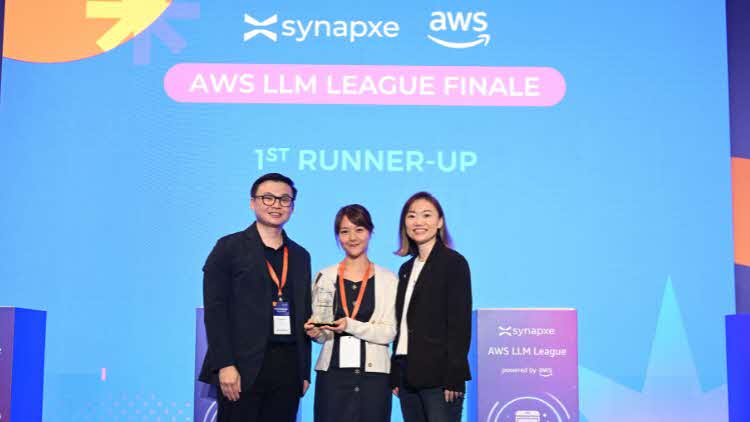Singapore’s national HealthTech agency, Synapxe, hosted its inaugural Artificial Intelligence (AI) conference, AI Accelerate 2025, for the public healthcare sector at the Punggol Digital District on 16 June 2025. Guest-Of-Honour, Health Minister Ong Ye Kung, gave the opening speech at the conference, addressing over 400 industry leaders, researchers, academics, innovators and government representatives.
AI Accelerate highlights Synapxe’s future-focused AI approach as it continues to partner healthcare institutions and the tech industry to boost AI capabilities and transform the HealthTech landscape in Singapore.
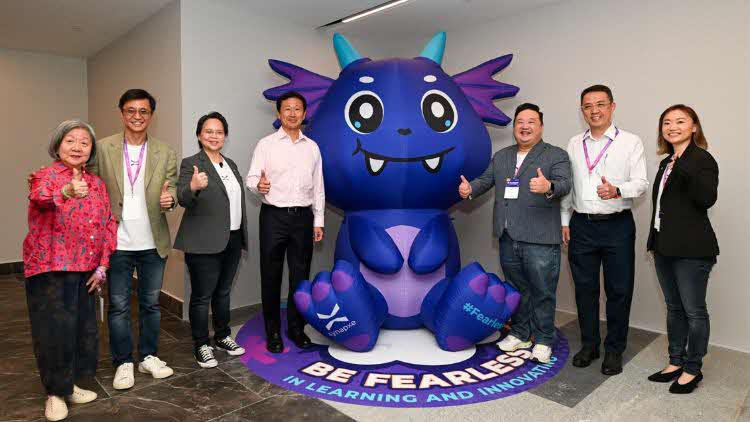
Harnessing AI for Good: Unlocking a Smarter Healthcare – CEO’s Address
In her welcome remarks at AI Accelerate 2025, the CEO of Synapxe, Ms Ngiam Siew Ying, addressed the audience’s “shared conviction of what we must do with AI”, adding that the event is a symbol for Synapxe’s “bold ambition, tight collaboration, and a strong commitment” to a “healthcare (that) is not only smarter, but more personal, more predictive, and more proactive”.

She added, “At Synapxe, we are laser-focused on what matters most – the human experience in healthcare. Technology alone cannot replace the heart and expertise of our healthcare professionals. What we need is to equip our people with the right skills and knowledge to confidently and effectively leverage AI in the work we do”.
This was later echoed in the Keynote Fireside Chat with Managing Director of OpenAI International, Mr Oliver Jay, and Synapxe’s Director of Data Analytics and AI Services Planning, Ms Christine Ang, where they unravelled the different ways Synapxe can leverage OpenAI’s multi-agentic framework that can make healthcare more accessible.
Keynote Fireside Chat: Designing the Future of Healthcare with Mr Oliver Jay, Managing Director for International, Open AI
Mr Oliver Jay, Managing Director of International, Open AI, offered a global perspective on the trajectory of GenAI, especially Large Language Models (LLMs), and its implications for healthcare, stating that,
“AI has the capacity to reduce the time spent on administrative work. For every 6 patients, an average of one hour is lost. With AI, that is reduced to 10 minutes, thereby allowing more meaningful interaction between clinicians and patients.”
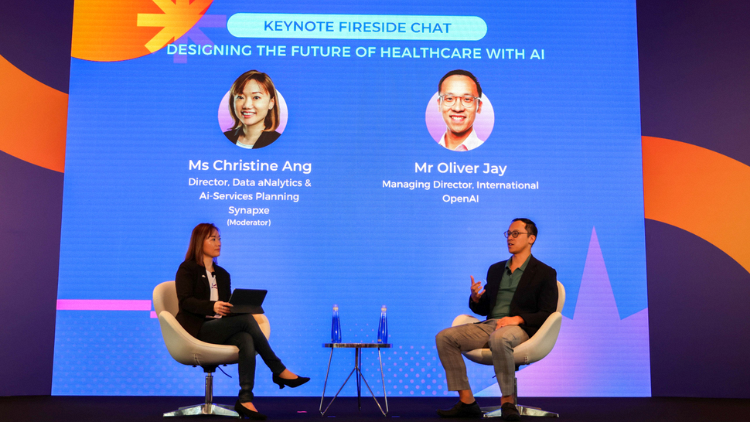
On understanding Agentic AI, Mr Jay explained that,
“The biggest advancement in AI are agents. Agents are AI that can not only answer questions but execute tasks. In a healthcare setting, that is a tremendous leap forward in terms of making healthcare more personalised and efficient.”
In summary, the Fireside Chat offered the audience a glimpse into OpenAI’s new multi-agentic framework and a prototype agentic AI apps builder, Agents SDK, that had been developed to facilitate transactional services such as booking appointments and answering general healthcare questions securely.
When asked on the future of adopting AI in healthcare, Mr Jay advised to “spend more time to understand the tech behind AI” to mitigate the “fear surrounding it from sci-fi narratives”. He added that companies who are starting on their AI journey and considering integrating AI in their solutions should “see where the bottleneck is and start small”.
The discussion followed the signing of a collaboration agreement between Synapxe and OpenAI, reinforcing Synapxe’s commitment to building a strong partnership with notable industry leaders to expand AI’s capabilities within Singapore’s healthcare.
The Rise of AGI in Healthcare: Agentic and Visual Intelligence at Work – Senior Principal Specialist Dr Goh Han Leong
"It takes a village to raise an AI project. Today, that same AI project connects this village, into a unified and seamless healthcare community", said Senior Principal Specialist from the Data Analytics and AI (DNA) Department at Synapxe, Dr Goh Han Leong, who opened his session in a rising area of interest in HealthTech: Artificial General Intelligence (AGI).
Unlike traditional AI models designed for specific tasks, AGI is a theoretical class of AI systems that can reason, problem-solve, learn and comprehend language comparable to human intelligence. To achieve this level, AI must demonstrate incredible competency across multiple domains, including visual perception, natural language processing, social and emotional engagement.

Dr Goh emphasised that the true power of AI in healthcare not only lies in its technological sophistication, but its ability to connect the healthcare ecosystem, ultimately improving patient outcomes and potentially reduce healthcare costs. He balanced this vision with a clear call for ethical, patient-centred design.
He stressed the need for careful consideration of real-world variables during development, explaining that “broad considerations such as environmental factors and having quality data” can help to “improve accuracy outcomes”.
He added that data can now appear in various types, including “structured, unstructured and genetic data, which can be used to enhance the capabilities of AI” when used as training input. Looking ahead, he described an exciting convergence of technologies shaping the road to healthcare AGI, and the expanding role of AI in preventive healthcare and its potential to optimise resource allocation across care settings.
Summary of Opening Panel Discussion: Key Messages and Takeaways
The opening panel discussion brought together esteemed leaders across the healthcare, tech, and education sectors to explore the theme, Building an AI-Ready Culture: Transformation from Within
The panellists included:
- Senior Vice President & General Manager of Asia Pacific & Japan, Databricks, Mr Ed Lenta
- Strategic Advisor and Chief Technological Officer, Google, Mr Glen Francis
- Chief Information and Chief Data Officer, Ministry of Health (MOH), Mr Colin Lim
- Infocomm Technology Cluster Deputy Director, STLA, Singapore Institute of Technology (SIT), A/Prof Karin Avnit
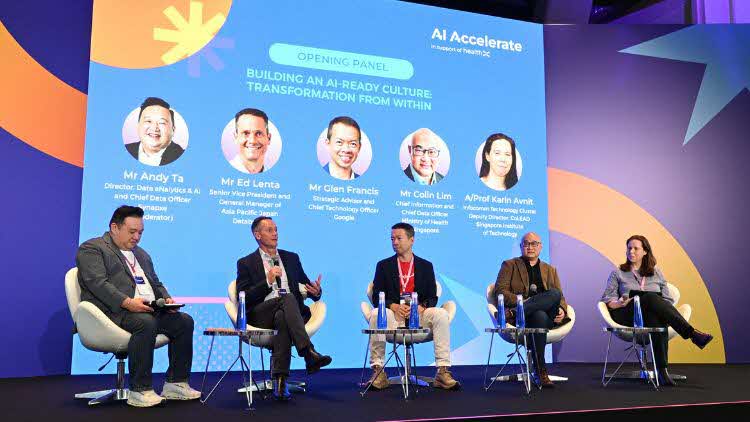
Moderated by Andy Ta, Director of Data Analytics & AI, and Chief Data Officer from Synapxe, the panel delved into actionable strategies to foster an AI-ready public healthcare and academia.
Mr Ed Lenta from Databricks stressed that data is the foundation of effective AI implementation. “Data is the fuel that powers efficiency in our systems. With over 15,000 customers, we’ve learned that a data-first approach, and making data more accessible, is what drives innovation.” He also noted that removing silos and embracing open technologies can future-proof healthcare systems, enabling scalability and innovation.
Mr Glen Francis of Google highlighted the role of capability development, stating, “It starts with empowering people. We’ve invested heavily in nationwide programmes involving startups, organisations and government agencies to instil a culture of innovative thinking.” He encouraged organisations to “keep abreast with rapid developments in AI and leverage it as a force multiplier, “start with small rocks and use AI to remove day-to-day inefficiencies”.
Representing MOH, Mr Colin Lim emphasised the need for identifying scalable and patient-centric use-cases, even as the public healthcare clusters need to get started by piloting their own AI initiatives. “While innovation is important, mainstream adoption requires support through strategic funding and leadership.” He urged healthcare professionals to think beyond traditional boundaries such as departments and institutions, and collaborate for the greater good of the national healthcare system.
From an educational perspective, A/Prof Karin Avnit of SIT spoke on the importance of equipping students and staff with digital competencies.
“At SIT, it is now mandatory for both students and academic staff to undergo annual digital skills training. Our students are also required to integrate AI into their real-world project work because we strongly believe in developing thinking thinkers who are constantly looking to improve things and make practical changes using innovative solutions.” She acknowledged the initial fear within academia surrounding AI, particularly concerns about job displacement and academic integrity, but noted that the mindset is gradually shifting, “By letting AI handle repetitive tasks, educators can focus on deeper, more meaningful student engagement.” As Mr Andy Ta aptly summarised, “there’s no one-size-fits-all solution. The key is to decide what kind of AI works best for your organisation’s context and just start.”
The Role of AI In Healthcare: A New Digital Landscape – Ms Ying Ying Yeoh (Roche Pharmaceuticals) and Mr Sandeep Basu (Microsoft)
In the afternoon tracks, there were insightful presentations by Roche Pharmaceuticals Singapore, IBM, and the National University Health System (NUHS), as they explored themes of purposeful and secure integration and innovation of AI in healthcare.
Ms Ying Ying Yeoh, General Manager of Roche Pharmaceuticals Singapore, spoke on the growing significance of explainable and trustworthy AI.
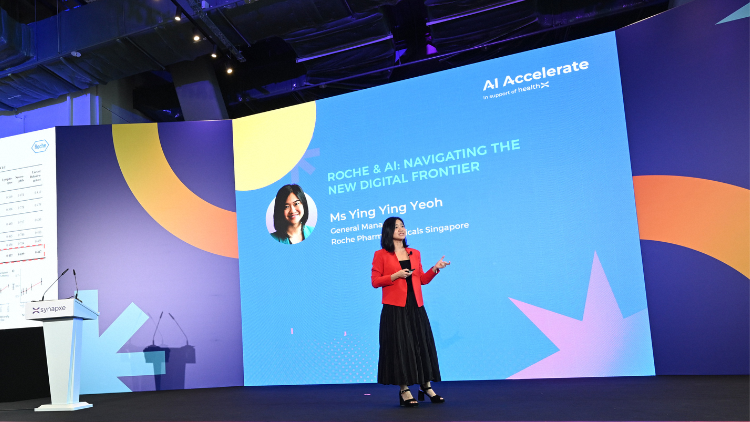
“There’s a growing need to make AI models more interpretable and understandable to healthcare professionals who may not be AI experts. This is key to building trust and facilitating adoption.”
Ms Yeoh highlighted how Roche is actively leveraging AI in several domains, from manufacturing sites that use AI to analyse production data and predict operational issues, to clinical trials where AI automates image analysis and develops predictive models for disease progression. These innovations enable Roche to identify new patient characteristics and refine treatment strategies, recognising that “no two patients are the same”.
Mr Sandeep Basu, Director of Data & AI Solutions ASEAN at Microsoft, emphasised how AI agents could democratise access to advanced healthcare capabilities.
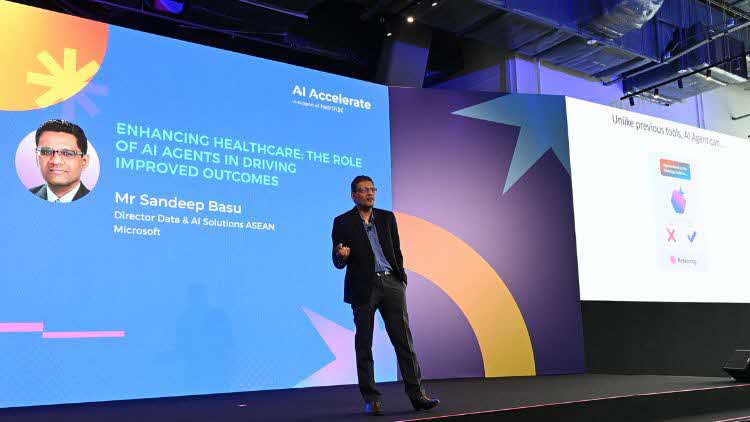
“AI agents allow us to package solutions so that even community hospitals can access the same technologies used in top academic medical centres,” he explained.
Unlike traditional automation, AI agents are capable of maintaining context, learning from past interactions, and performing complex reasoning with minimal reprogramming. “These agents represent a shift from static tools to dynamic systems - ones that can reason, adapt, and support clinicians in real time.”
He encouraged healthcare institutions to explore agent-based platforms as they scale AI adoption securely and responsibly.
Innovating and Adopting AI in Healthcare – Mr Engin Ozbay (IBM) and Dr Andrew Makmur (NUHS)
Mr Engin Ozbay, Associate Partner in Cybersecurity Services at IBM, presented a timely reminder of the importance of security in AI systems. He outlined best practices for developing responsible AI tools, such as embedding robust governance frameworks, ensuring regulatory compliance, and prioritising ethical design from the ground up. “AI in healthcare must be both powerful and secure. That starts with integrating cybersecurity into the AI lifecycle, not as an afterthought, but as a foundation.”
Following his presentation, Dr Andrew Makmur, Group Chief Technology Officer at the National University Health System (NUHS), shared real-world lessons from NUHS’ journey with AI, sharing candidly that integrating AI in public healthcare has been a long and complex journey. He advocated for a patient-centric approach, underpinned by interoperability across systems and institutions.
“We’ve learned that successful AI implementation is multidisciplinary” explained Dr Makmur, adding that having a diverse team of clinicians, technologists, engineers, and compliance experts can helps address challenges holistically. Dr Makmur also emphasised the importance of governance in building trust. “People need to know that they are able to trust what is built, that it is working, it is safe and there is no liability when adopted,” he concluded.
Accelerating AI Adoption and Augmenting Patient Care with AI – Elizabeth Pan (NHG) and Eileen Lew (SingHealth)
Ms Elizabeth Pan, Assistant Director at the Digital Innovation Office in Centre for Healthcare Innovation, National Healthcare Group (NHG), spoke about adopting a hybrid strategy in AI deployment. She underscored NHG’s threefold commitment.
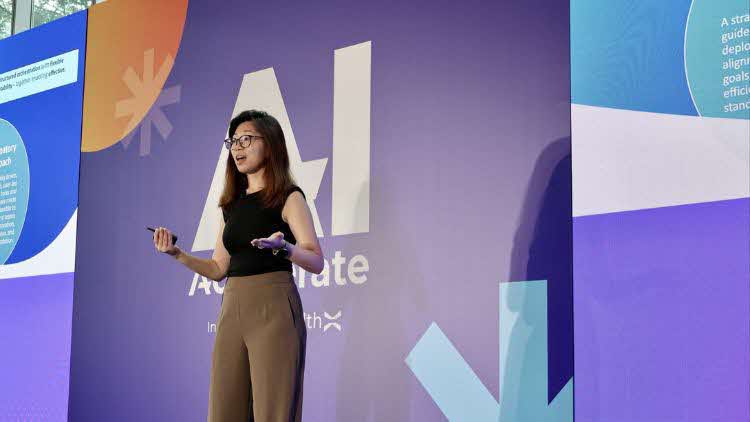
“First, to better serve patients; second, to enhance our workforce transformation; and finally, to prepare our systems for the future of healthcare.” Ms Pan acknowledged the multifaceted challenges of AI implementation, ranging from resistance to change and leadership gaps, to infrastructure constraints and risk management concerns. She concluded with a clear message: overcoming these hurdles requires strong alignment between vision, people, and systems.
Dr Eileen Lew Yi Lee, Senior Principal Analyst in Machine Learning at SingHealth’s Office of Insights & Analytics, introduced a customized set of automated evaluation metrics for Note Buddy, leveraging on the healthcare-specific framework, SCORE which encompasses Safety, Consensus, Objectivity, Reproducibility, and Explainability.
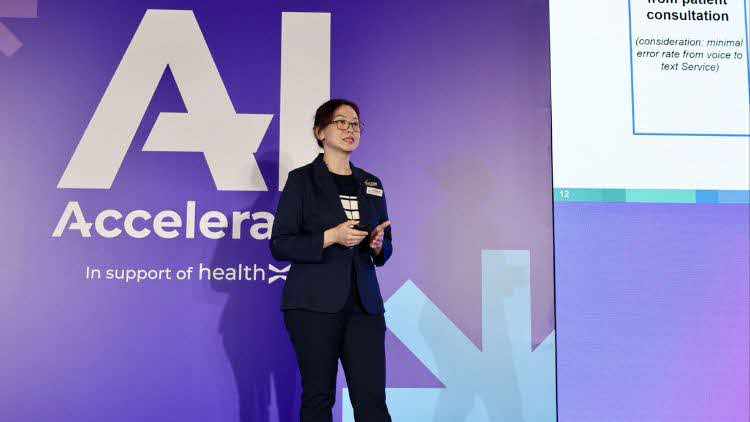
“These are the key criteria we’ve identified for evaluating the use of large language models in healthcare,” Ms Lew explained. “This framework ensures that AI tools not only function effectively but do so in a safe, ethical, and transparent manner.” She also highlighted the importance of user feedback, explaining how Note buddy, their AI-powered application built in collaboration with Microsoft AI, maintains quality through a robust feedback loop. “Our users are the first line of quality assurance, allowing us to continuously improve based on their feedback.”


